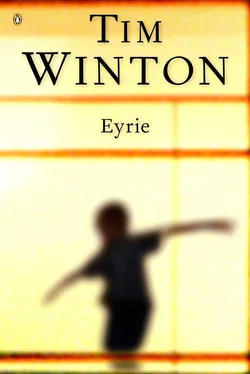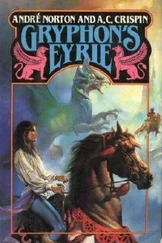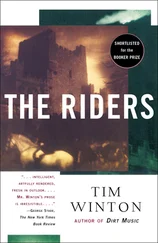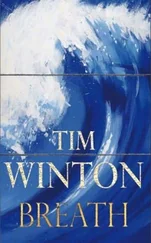They told us there was angels lookin out for us.
Well.
When I was livin at your place with Nev and Doris, it sorta felt true.
And now?
Angels move away, mate. They die. They get old. They leave you on yer own.
Still, he said. You’re a tough bit of gear. No illusions. Just yourself.
Your self , she said with unsettling authority. Your self isn’t enough.
Keely had nothing honest to offer her. How could you counter such a sense of abandonment? She really did carry with her a kind of desolation. It wasn’t just his parents who’d vanished from her life, but their fierce saviour, too, their Great Defender evaporating along with them. That much he understood. He had a hole that size in him too; sometimes it was the size of him entire.
He gazed out at the retro Minis, the 4x4s, the muscle cars ahead in the line. Behold, the miracle of hire-purchase and lax lending. Clearly he wasn’t the only one to feel empty. What a pageant of consolation this line of vehicles was, what a spiritual mystery conveyances had become.
He angled the poxy little A/C vent his way. This hangover wasn’t just making him maudlin, it was bringing on mortal thoughts — not helpful. A blast of icy air would have been welcome. But from this triumph of Korean engineering? Not happening.
Listen, she said cautiously after a long silence. Now I’ve got the car, I’m gunna visit Carly.
That’ll be nice, he said, sensing it coming.
Yeah, she said. I’m going up Saturday week.
Please, no, he thought — don’t ask me.
I was gunna say. If maybe you wouldn’t mind.
Keely averted his gaze. His temples felt scorched. He didn’t want this.
It’s way the hell out towards the hills, I know, she said.
Keely ran his dry tongue across his teeth. It was maddening, this obscure, relentless sense of obligation. It wasn’t his fault they’d lost the house and moved away from Blackboy Crescent. You couldn’t hold Nev responsible for a heart attack. Doris had her own children to see to; hadn’t she done all she could? This was getting ridiculous.
He said nothing, gave her no relief.
I know you’ve never met her or nothin. But Kai’s always funny about it. If you go he’ll be orright. It’s his mum, Tom.
He shifted in his seat, angry now.
Like I said, she murmured. Don’t feel obliged.
Keely knew he didn’t have the balls to say no. He wondered if she could see it in his face, if she’d known it all along. He drew a defeated breath, put a hand on her thigh from sheer opportunism and she didn’t flinch.
Not a problem, he said with all the irony he could muster.
God love ya, Tom.
No chance of that, he thought, taking his hand away ruefully.
The bell rang. The schoolyard filled instantly with darting, leaping bodies.
There he is, he said too brightly.
Kai emerged alone from the mob with his distinctive stiff gait and air of self-containment. He was solitary, oblivious, preoccupied. When he saw his grandmother waving from the car window he halted and stared.
God, she said. I could eat him up. Look at him.
Hyundai, said Kai as he finally opened the rear door. Smaller than a Volvo.
And quite a bit cheaper, said Keely.
The boy looked at him warily.
I told you about the beard, said Gemma.
It was better before.
I agree, said Keely. But she made me.
Come on, you heathen. Get in.
The boy pursed his lips and slid in alongside the trash on the back seat. Hyundai, he said again. Hy. Un. Dai.
It’s Korean for Nana, said Keely.
The message on the machine was curt. Doris sounded agitated, testy. He belted down some pipe-sick water and called her.
What is it? he asked, looking out across the sound as the southerly began to ruffle the sea.
The islands looked insubstantial as soufflés. The cement-works dredge ploughed on across the bank, pillaging shell for its lime, ripping sea grass up by the tonne, leaving a filthy plume in its wake. They’d recently secured another decade’s lease. Surprise, surprise. And a few hundred metres inland their stack rained particulates on the roofs of five thousand homes. With an EPA licence, no less. Business as usual. Democracy at work.
Mum, what’s the matter?
I was about to ask you, Tom.
You’ve lost me.
Faith called.
How is she?
You should know. You spoke to her last night.
Me? Last night?
She’s upset. So am I.
Keely felt a twinge of dread, said nothing. He had not called his sister last night. After seeing Gemma in the early evening he hadn’t spoken to anyone at all. Had he?
She said you were awful, said terrible things.
Keely had been sick all day. But not as ill as he felt this minute.
Tom?
I’m here.
What’s happening?
I’ll call her now.
She’s on a plane. Leave her be.
Shit.
What’s got into you?
I don’t know, Mum. I’ll fix it up.
She’s your sister. She doesn’t deserve this. You think because she works with money she doesn’t have a conscience? She’s a good person — you have no idea.
I don’t remember, he confessed.
That she’s your sister, that I’m proud of her?
Calling her, Mum. I don’t remember calling her.
Which speaks for itself.
Keely leant against the wall, took the sting right through him. He deserved it.
Have you cooked yourself dinner?
It’s three thirty-five, Doris.
Don’t dare take that tone with me.
Sorry.
I’ve got some mussels. More than I can eat. I should know better, but when you look at them in the shop, you see the handful it takes to feed yourself, it looks pathetic, like it wouldn’t feed a sparrow.
I know, he said. Cooking for one, it’s science over instinct.
Dreary, that’s what it is. No wonder all these Claremont ladies eat out. Divorce is the only thing keeping the hospitality industry afloat.
God, he thought in wonder. She’s moved on already. Like some sort of moral amazon, she’s sucked the poison from the wound, wiped her mouth and resumed the fight; it’s bloody sainthood.
I’m sorry, he said. I’ll do whatever it takes.
I’ll be there at five, she said. I’ll call you when I’m outside.
Mum, I’ll catch the train.
No, I’ll be there directly.
He put down the phone and ran the shower. His face in the mirror was ailing. His cheeks were lumpy with ingrown hairs, stippled in places by shaving rash. He thought he preferred the preacher with the hurtin heart to the feeble wonk looking back at him. Doris probably hadn’t even bought the mussels yet; she’d be on her way to the Boatshed Market to get them now. What a rube he was; she was brilliant.
After he’d scraped his chin and dressed, while he waited for Doris to do her thing, he called Faith’s landline, left a message on the machine. His apology was heartfelt but after a few moments he could feel himself rambling. He sounded like a drunk, a loon. He tried to wind it up. But lost his nerve and rang off mid-sentence.
The moment he hung up he wished he hadn’t called. She’d think he was barking. He’d only made it worse. He stared at the carpet, felt the reflux of panic in his throat. When the phone rang he grunted and was relieved to hear it was only Doris.
Her back garden smelt of frangipani and citronella and in the evening light white cockatoos roamed in raucous packs above the treetops of the neighbourhood. On the sea breeze came the waft of cut lawns, barbecue smoke, leaf-blowers. The proximity of the river was like something on the skin, a pleasant clamminess that brought to mind tree roots, undercut banks, stranded jellyfish. The house’s rear deck was deep and broad. The little table hardly occupied a corner.
Читать дальше












